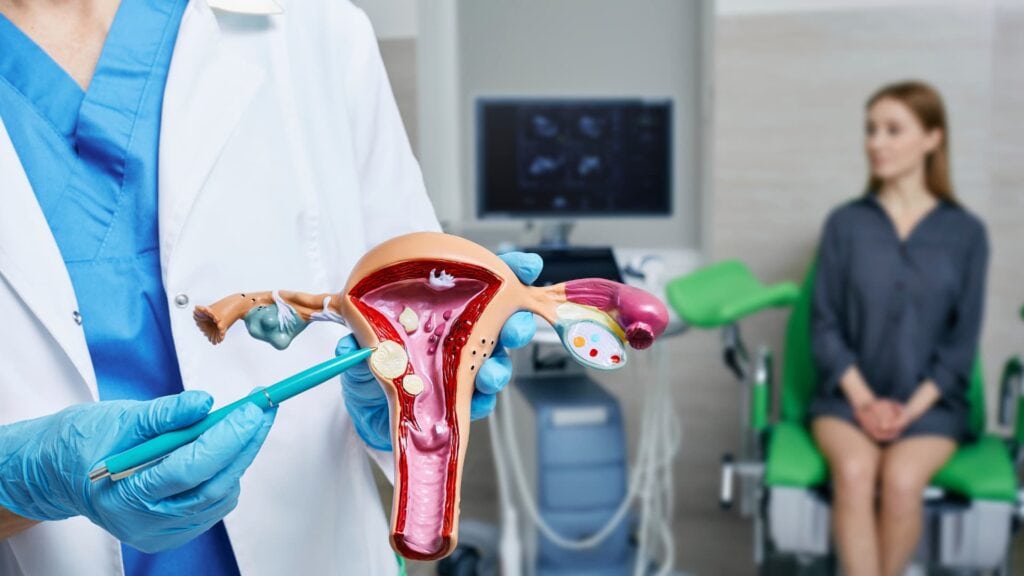Polycystic ovary syndrome (PCOS)
PCOS is a hormonal disorder characterized by multiple cysts on the ovaries. The exact cause of PCOS is unknown, but it is believed to be a combination of genetic and environmental factors. Women with PCOS have higher levels of androgens (male hormones) and insulin in their bodies, which can disrupt the normal functioning of the ovaries.
PCOS and its Impact on Fertility
PCOS can have a significant impact on fertility. The hormonal imbalances associated with PCOS can interfere with the regular ovulation process, making it difficult for women to release mature eggs for fertilization. This can result in irregular or absent menstrual periods, making it challenging to predict ovulation and time intercourse for conception. Additionally, cysts on the ovaries can further disrupt the ovulation process.
Common Symptoms of PCOS
Common symptoms of PCOS-related infertility include irregular menstrual cycles, anovulation (lack of ovulation), and difficulty getting pregnant. Women with PCOS may also experience other symptoms, such as weight gain, acne, excessive hair growth, and insulin resistance. It is important for women experiencing these symptoms to seek medical evaluation and diagnosis to determine if PCOS is the underlying cause of their infertility.
Endometriosis
Endometriosis is a chronic condition in which the tissue that lines the uterus, known as the endometrium, grows outside the uterus. This tissue can implant and grow on the ovaries, fallopian tubes, and other organs in the pelvic area. As a result, it can cause inflammation, scarring, and the formation of adhesions, which are bands of fibrous tissue that can bind organs together.

How Endometriosis Can Lead to Infertility
When endometriosis affects the reproductive system, it can lead to infertility. Endometrial tissue outside the uterus can interfere with the normal functioning of the ovaries, fallopian tubes, and uterus. It can cause blockages in the fallopian tubes, preventing the sperm from reaching the egg for fertilization. It can also affect the quality of the eggs produced by the ovaries and interfere with the implantation of a fertilized egg in the uterus.
Symptoms of Endometriosis
Symptoms of endometriosis can vary from woman to woman, but common signs include pelvic pain, painful periods, heavy or irregular bleeding, pain during intercourse, and infertility. It is essential for women experiencing these symptoms to seek medical attention to receive a proper diagnosis and appropriate treatment.
Pelvic inflammatory disease (PID)
PID is an infection that occurs when bacteria from the vagina or cervix travel up into the uterus, fallopian tubes, or ovaries. This infection can happen due to sexually transmitted infections (STIs) such as chlamydia or gonorrhea, but it can also occur due to other types of bacteria. The infection causes inflammation in the pelvic organs, leading to symptoms such as pelvic pain, abnormal vaginal discharge, and fever.
Common Causes of PID
Common causes of PID include unprotected sex with multiple partners, a history of STIs, and the use of intrauterine devices (IUDs). It is critical to seek medical attention if you experience symptoms of PID, as early diagnosis and treatment can help prevent complications such as infertility.
PID and its Impact on Fertility
PID can have a significant impact on fertility in women. The infection can cause scarring and damage to the fallopian tubes, making it difficult for eggs to travel from the ovaries to the uterus. This damage can result in infertility or an increased risk of ectopic pregnancy, where the fertilized egg implants outside the uterus.
In addition to tubal damage, PID can lead to other reproductive complications, such as chronic pelvic pain, ovarian cysts, and adhesions (scar tissue) in the pelvic organs. These issues can further contribute to infertility and make it challenging to conceive.
Statistics show that PID is a leading cause of infertility worldwide. According to the Centers for Disease Control and Prevention (CDC), about 1 in 8 women with a history of PID experience difficulties getting pregnant. Individuals with PID should know these risks and seek appropriate medical care and support.
Uterine fibroids
Uterine fibroids are incredibly common, with studies estimating that up to 70% of women will develop fibroids by age 50. These growths can vary in size and number, and while many women may have fibroids without experiencing symptoms, others may experience heavy menstrual bleeding, pelvic pain, and fertility issues.

How Uterine Fibroids Impact Fertility
Uterine fibroids can impact fertility in several ways. Firstly, the presence of fibroids can alter the shape and size of the uterus, making it difficult for a fertilized egg to implant properly. Fibroids can also block or distort the fallopian tubes, preventing sperm from reaching the egg.
Additionally, fibroids can disrupt the blood supply to the uterus, leading to decreased blood flow to the endometrium (the uterus lining). Decreased blood flow can affect embryo implantation and increase the risk of miscarriage. Furthermore, fibroids can cause uterine inflammation, interfering with the implantation process.
Treatment Options for Uterine Fibroids
Various treatment options are available for uterine fibroids, depending on the size, location, and symptoms associated with the fibroids. These include medication, minimally invasive procedures such as uterine artery embolization or focused ultrasound surgery, and surgical removal of fibroids.
The treatment choice will depend on factors such as the severity of symptoms, desire for future fertility, and overall health. In some cases, treatment of fibroids can improve fertility outcomes by removing obstacles to conception and implantation.
Thyroid disorders
Thyroid disorders and infertility are closely intertwined. Research studies have consistently shown a higher prevalence of thyroid disorders among individuals struggling with infertility than among the general population. For example, a study published in the Journal of Clinical Endocrinology & Metabolism found that women with unexplained infertility were more likely to have thyroid disorders than fertile women.
Another study published in the journal Fertility and Sterility found that women with hypothyroidism (underactive thyroid) had a significantly higher rate of infertility than those without thyroid disorders. Similarly, women with hyperthyroidism (overactive thyroid) also had a higher rate of infertility than those without thyroid disorders.
These studies highlight the importance of recognizing and addressing thyroid disorders in individuals struggling with infertility. Treating the underlying thyroid condition can improve their chances of successful conception and pregnancy.
How Thyroid Disorders Impact Fertility
Thyroid disorders can cause menstrual irregularities, significantly impacting ovulation and conception. When the thyroid gland is not functioning correctly, it can disrupt the normal hormonal balance necessary for regular menstrual cycles.
Irregular periods can make it difficult to predict ovulation, which is crucial for successful conception. Without regular ovulation, it becomes challenging to time intercourse correctly and increase the chances of fertilization.
Treatment Options for Menstrual Irregularities Caused by Thyroid Disorders
Treatment options for menstrual irregularities caused by thyroid disorders depend on the underlying cause of the problem. In some cases, treating the thyroid disorder itself may help regulate menstrual cycles and improve ovulation. In other instances, additional interventions such as hormonal therapy or fertility treatments may be necessary to restore regular menstrual cycles and increase the chances of successful conception.
Diabetes
Diabetes can disrupt the delicate balance of reproductive hormones in both men and women. In women, diabetes can lead to irregular menstrual cycles, anovulation (lack of ovulation), and hormonal imbalances such as high testosterone levels. These hormonal imbalances can make it more difficult for women to conceive and increase the risk of conditions such as polycystic ovary syndrome (PCOS).
Insulin resistance is a common feature of diabetes, particularly in type 2 diabetes. It occurs when the body's cells become less responsive to insulin, leading to elevated blood sugar levels. Insulin resistance can have a significant impact on female fertility.
Diabetes and Conception
Maintaining good blood sugar control is essential for individuals with diabetes trying to conceive. Elevated blood sugar levels can affect the quality of eggs and sperm, making it more difficult for fertilization to occur. High blood sugar levels can also increase the risk of pregnancy complications, such as gestational diabetes and preeclampsia.
By keeping blood sugar levels within a target range, individuals with diabetes can optimize their fertility and improve their chances of a healthy pregnancy. Regular monitoring, following a balanced diet, exercising regularly, and taking medication as prescribed by a healthcare professional can help keep blood sugar levels within a normal range.
Managing Fertility With These Conditions
It is important to note that while these conditions can negatively impact fertility, many can be managed or treated with medical intervention. Consulting with a healthcare professional or fertility specialist is recommended for individuals experiencing difficulties conceiving. With the proper diagnosis and treatment, a fertility specialist can inform you which fertility treatments are best for you.
- Protecting Your Health: Choosing A Sperm Bank Over Natural Insemination
- Hatching a Plan: Learning The Basics About Assisted Hatching in IVF
- Navigating GYN Surgery Before Artificial Insemination
- PGT Testing and Its Role in IVF Treatment
- The Ultimate Guide To Where You Can Donate Sperm In All 50 States

